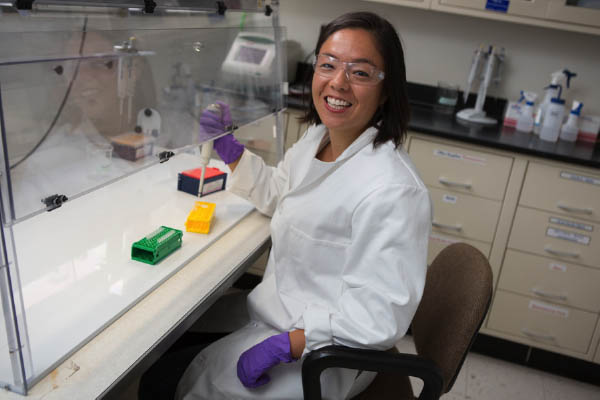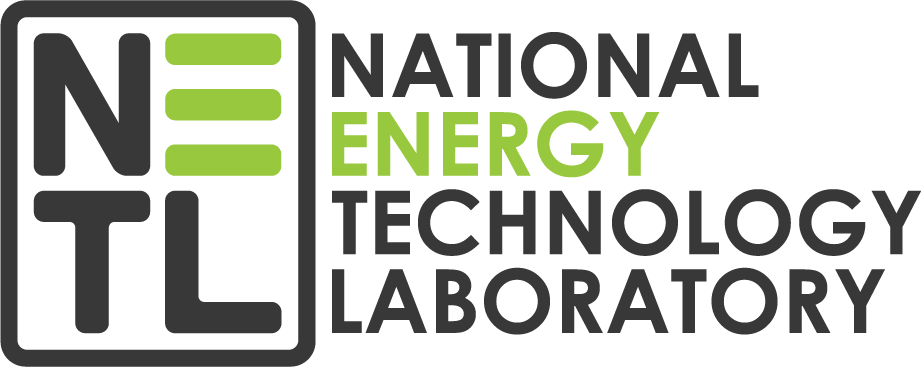NETL mentor benefits from cross-collaboration with ORISE participants
Meet Mentor Djuna Gulliver
Microbes are among the oldest known organisms on Earth and continue to fascinate the scientists dedicated to their continued research and discovery. These single-cell organisms play essential roles in every facet of human life, from disease resistance to oxygen production, and are increasingly studied as potential sources for renewable energy and hazardous waste remediation.

By combining her expertise in microbiology with the varied skills and knowledge her mentees bring to the lab, Djuna Gulliver, PhD, makes progress on complex research projects that benefit most from cross-collaboration. Photo courtesy of NETL.
Djuna Gulliver, PhD, a long-time lover of microbiology and its limitless implications, can’t get enough of them. She spent her undergraduate years in and out of microbiology labs, and she devoted her doctoral thesis at Carnegie Mellon University to the role of microbial communities in carbon storage. It’s a topic she still studies today at the National Energy Technology Laboratory (NETL) in Pittsburgh, PA where she also serves as a mentor for participants in research programs administered by the Oak Ridge Institute for Science and Education (ORISE).
While her ultimate research goal through the years has stayed the same—to improve scientists’ understanding of how evolving microbial communities impact humans—technological advancements have forced Gulliver to modify her approach. No longer can she, nor should she, rely on her own expertise alone.
“The field of microbiology moves so fast,” Gulliver said. “Bioinformatics, or computer programming for microbiologists, is becoming increasingly important. In order to stay current in this field and also to stay current in environmental engineering and geochemistry, I need to surround myself with other experts. The ORISE program allows me to bring on a diverse group of student and faculty researchers with different backgrounds and expertise. It has made my projects much more interdisciplinary and well-rounded while providing a deeper learning experience for the ORISE participants.”
Researchers of all academic levels, from college freshmen to faculty members, can apply to the science education programs at NETL. The programs assign participants to real-world research projects and pair them with staff scientists like Gulliver to maximize their educational experience.
“The ORISE researchers I work with come from all from different fields. One is a microbiologist, one is a geologist, and one is a petroleum engineer. They bring different expertise and fresh enthusiasm for a large research project that would otherwise be daunting,” explained Gulliver. “Our biweekly meetings have been a great illustration of what can be accomplished with effective communication between different fields.”
Gulliver’s research benefits directly from this mentor-mentee collaboration, while her mentees benefit in ways both tangible—through acquired skills—and intangible—through bolstered confidence and honed intellect.
“One of the most difficult parts of research is the meticulous review of material pre-publication. It can be very discouraging to receive a harsh critique of something you worked so hard to develop,” said Gulliver. “But it is a beautiful moment when my mentees push past that critique and realize they made something even better than they knew possible. It’s exciting to see young researchers learn to cope with these typical trials of the job and feel the pride we all work to achieve.”
Mentorship involves a variety of tasks, from regular meetings, to guidance on instrumentation, and professional networking support. A key role of the mentor is to help the mentee successfully advance the project at hand. But Gulliver believes an even greater role is to support the mentee when the project faces unforeseen challenges.
“Mentorship has taught me to be a much better listener,” said Gulliver. “The research field is difficult, and it’s easy to get overwhelmed and forget why we became researchers in the first place. My mentees have a lot of concerns over the end goal of their research and their careers. They have to be heard, and showing them that I understand these worries is just as important—if not more so—than directing them in their research.”
Gulliver has mentored participants for two years and plans to continue indefinitely.
“Being a mentor allows you to add a different perspective to your research projects. As a microbiologist, it’s easy to get stuck on how the microbial species are changing with the environment without considering what this means for the larger picture,” she said. “But add a geochemist and a geologist, and they’ll tell you how that microbial community change affects the whole environment, and why we should care.”


